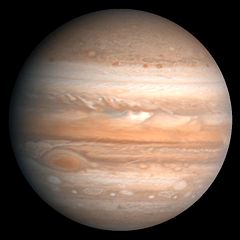JUPITER 


Jupiter
Jupiter is the largest planet in the solar system. Its diameter is 88,846 miles (142,984 kilometers), more than 11 times that of Earth, and about one-tenth that of the sun. It would take more than 1,000 Earths to fill up the volume of the giant planet. When viewed from Earth, Jupiter appears brighter than most stars. It is usually the second brightest planet -- after Venus.
Physical features of Jupiter
Jupiter is a giant ball of gas and liquid with little, if any, solid surface. Instead, the planet's surface is composed of dense red, brown, yellow, and white clouds. The clouds are arranged in light-colored areas called zones and darker regions called belts that circle the planet parallel to the equator.
Orbit and rotation
Jupiter travels around the sun in a slightly elliptical (oval-shaped) orbit. The planet completes one orbit in 4,333 Earth days, or almost 12 Earth years.
Mass and density
Jupiter is heavier than any other planet. Its mass (quantity of matter) is 318 times larger than that of Earth. Although Jupiter has a large mass, it has a relatively low density. Its density averages 1.33 grams per cubic centimeter, slightly more than the density of water. The density of Jupiter is about 1/4 that of Earth. Because of Jupiter's low density, astronomers believe that the planet consists primarily of hydrogen and helium, the lightest elements. Earth, on the other hand, is made up chiefly of metals and rock. Jupiter's mix of chemical elements resembles that of the sun, rather than that of Earth.
Temperature
The temperature at the top of Jupiter's clouds is about -230 degrees F (-145 degrees C). Measurements made by ground instruments and spacecraft show that Jupiter's temperature increases with depth below the clouds. The temperature reaches 70 degrees F (21 degrees C) -- "room temperature" -- at a level where the atmospheric pressure is about 10 times as great as it is on Earth.
Magnetic field
Like Earth and many other planets, Jupiter acts like a giant magnet. The force of its magnetism extends far into space in a region surrounding the planet called its magnetic field. Jupiter's magnetic field is about 14 times as strong as Earth's, according to measurements made by spacecraft. Jupiter's magnetic field is the strongest in the solar system, except for fields associated with sunspots and other small regions on the sun's surface.
Satellites
Jupiter has 16 satellites that measure at least 6 miles (10 kilometers) in diameter. It also has many smaller satellites. Jupiter's four largest satellites, in order of their distance from Jupiter, are Io, Europa, Ganymede, and Callisto. These four moons are called the Galilean satellites. The Italian astronomer Galileo discovered them in 1610 with one of the earliest telescopes.
Rings
Jupiter has three thin rings around its equator. They are much fainter than the rings of Saturn. Jupiter's rings appear to consist mostly of fine dust particles. The main ring is about 20 miles (30 kilometers) thick and more than 4,000 miles (6,400 kilometers) wide. It circles the planet inside the orbit of Amalthea.
The impact of Comet Shoemaker-Levy 9
In March 1993, astronomers Eugene Shoemaker, Carolyn Shoemaker, and David H. Levy discovered a comet near Jupiter. The comet, later named Shoemaker-Levy 9, probably once orbited the sun independently, but had been pulled by Jupiter's gravity into an orbit around the planet. When the comet was discovered, it had broken into 21 pieces. The comet probably had broken apart when it passed close to Jupiter.
Flights to Jupiter
The United States has sent six space probes to Jupiter: (1) Pioneer 10, (2) Pioneer-Saturn, (3) Voyager 1, (4) Voyager 2, (5) Ulysses, and (6) Galileo.























